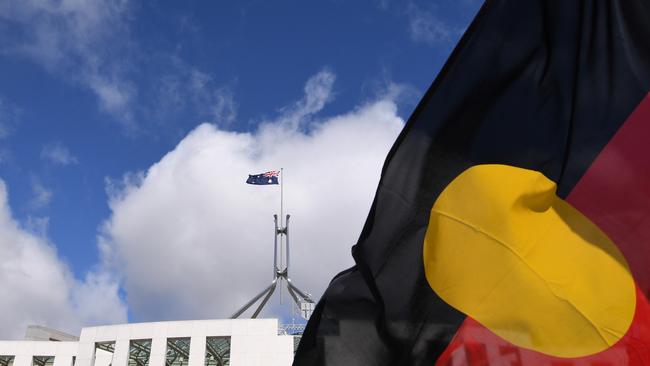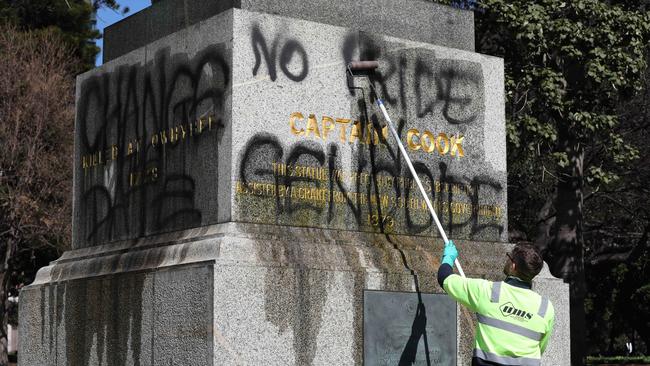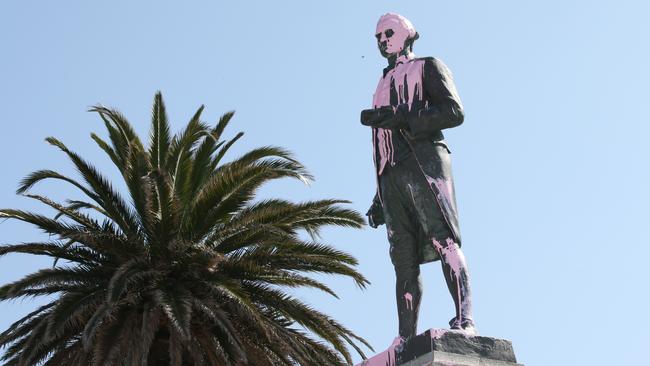Opinion: We can’t ignore history, white or indigenous
The vast majority of Australians want to leave our national day where it is. But the indigenous community should be asked by referendum to pick a date to honour their culture, writes Doug Morrissey.

Opinion
Don't miss out on the headlines from Opinion. Followed categories will be added to My News.
In 2017, Captain James Cook’s statue in Hyde Park Sydney was vandalised by graffiti. “No Pride in Genocide” and “Change the Date” were daubed across the pedestal base in thick black lettering.
At the same time, public monuments to NSW governor Lachlan Macquarie and Queen Victoria were defaced.
Two days before Australia Day 2018, Cook’s statue at St Kilda was splashed with pink paint. “No Pride” and an Aboriginal flag were painted across the statue’s base seemingly linking gay pride to Aboriginal activism.
MORE: RITA PANAHI: DATE WON’T CHANGE REALITY
POLL SHOWS MOST WANT DATE TO STAY
THIS IS HOW TO HAVE AN AUSTRALIA DAY DEBATE

A statue of explorers Burke and Wills was given a coating of green paint and the word “Stolen” was prominently displayed.
City of Sydney historian Lisa Murray questioned the removal of the earlier graffiti saying: “This is not an act obliterating Australia’s history. It is part of a growing public consciousness to recognise Australia’s history and to point out the complexity of our past.”
Scrawling graffiti on public monuments is not part of a growing public consciousness. It is the work of a puerile few wanting to create sensation and division.
Murray added she was pleased “our ways of understanding and remembering the past are shifting. It demonstrates that Aboriginal people are demanding a voice and their rightful place in our history”.
What Murray neglected to say, as Kevin Rudd’s Sorry Day apology, and numerous books and television programs over the past two decades demonstrate, is that indigenous Australians have gained their rightful place in our history. The vandalising of statues and the push to change Australia Day is a politically motivated campaign by a disaffected minority not supported or approved of by the majority of Australians.

Australia Day cannot be celebrated without generating a flurry of “Invasion Day” slurs and claims of genocide. Defacing public monuments and belittling the pioneer past as cruel and irredeemable is a distortion of the past, as untrue as the older version of Australian history which largely ignored Aboriginal contributions.
The British came to Australia with an imperial sense of themselves as tamers of a new continent and Christian civilisers of the indigenous inhabitants. There was an 18th century pride and overconfidence in the manner of the British arrival.
James Cook stepped ashore at Botany Bay on the April 29, 1770, not as a would-be conqueror or destroyer of Australia’s Aborigines. He came as a man of science and prominent Pacific Ocean explorer.
Governor Arthur Phillip, on his arrival with the First Fleet in January 1788, said: “I do not doubt that this country will prove the most valuable acquisition Britain ever made. We have come here today to take possession of this fifth great continental division of the earth on behalf of the British people. How grand is the prospect which lies before this youthful nation.” Phillip’s imposing vision, 230 years later, is more bountiful, more democratic — and no longer tied to Britain — than he could have ever imagined.
Invasion and genocide was not on the agenda of either the British government or later colonial governments. They can be accused of exercising an overzealous paternalism towards Australia’s Aborigines, meant to bring about assimilation of what was then perceived as a doomed race.
To call the British presence an “invasion” and the intention to bring about assimilation “genocide” is just culture wars point scoring. As Jewish Holocaust historian Inga Clendinnen has pointed out, intention is all in defining genocidal behaviour.
Aborigines and white men, women and children died from frontier violence carried out by both sides. Aborigines died in greater numbers for many reasons; disease was the greatest killer along with alcoholism. Very few white settlers killed or approved of the killing of Aborigines. A deeply religious and humanitarian motive was at work within Victorian society, as well as hanging for all killings regardless of the race of the perpetrators.
Rarely discussed, because it does not fit the conflict model, is the harmony and co-operation that existed between the races as white settlement spread. The complexity of history Murray talks about applies equally to Europeans as it does to Aborigines. How else can the past be properly assessed and understood?
Australia Day is not under threat, despite the machinations of some Melbourne and Sydney inner-city councils and the midnight vandalism by a few activists. An Institute of Public Affairs opinion poll conducted on January 14 shows that three out of four of us want Australia Day celebrated on January 26. An overwhelming 78 per cent said they were proud to celebrate Australia’s founding on that day.
So the Aboriginal community should be asked by referendum to nominate a date to celebrate an indigenous Day to honour their ancestor’s long occupation of the Australian continent. That would be a unifying rather than a divisive move accepted by everybody.
Doug Morrissey is a writer whose most recent book is Ned Kelly: Selectors, Squatters and Stock Thieves, Connor Court 2018


